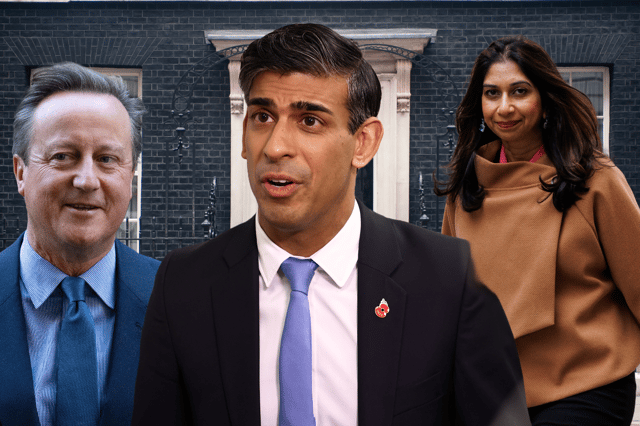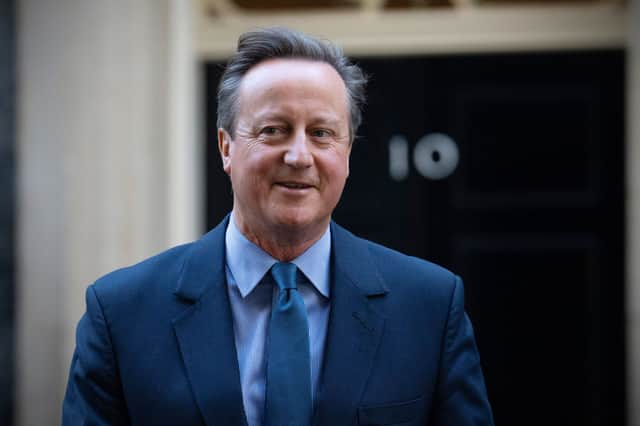Rishi Sunak trashing his strategy to bring back David Cameron is a sign of desperation
and live on Freeview channel 276
Just over a month ago, on stage at the Conservative Party Conference, Rishi Sunak decried his predecessors as Prime Minister saying “politics doesn’t work the way it should”.
“We’ve had 30 years of a political system which incentivises the easy decision, not the right one,” he said. “30 years of vested interests standing in the way of change, 30 years of rhetorical ambition which achieves little more than a short-term headline.” It was a surprising move from Sunak, trampling on his party’s legacy to try and frame himself as the change candidate at the next election.
Advertisement
Hide AdAdvertisement
Hide AdAnd who presided over six years of these short-term politics, with “politicians saying things, and then nothing ever changing” - one David Cameron, who made an astonishing return to the Cabinet today as Foreign Secretary. This caught everyone off guard. No one suspected the former Prime Minister - who appears to have spent most of the past seven years pottering around his shed, alongside a bit of lobbying (we’ll come back to this) - ever to come back to frontline politics.
In potentially the biggest dead cat in recent political history, it rapidly moved the story on from Sunak’s unruly Home Secretary Suella Braverman - who had been hogging the headlines for the past week. The fact Sunak felt he had to frame her sacking as part of a wider reshuffle, to try and stop her becoming a right-wing martyr, shows his vulnerability and weakness.


It was obvious last week that she had defied Downing Street orders and had to go, however the Prime Minister clearly didn’t feel like he had the authority to fire her as a one-off. Now Braverman returns to the backbenches to launch a leadership campaign, with a raft of supporters who will be looking to destabilise Sunak.
But the shock appointment of David Cameron shows some semblance of panic in No10, with Rishi Sunak ripping up the script and strategy he unveiled only a month ago. After trying to paint himself as the change candidate going into the next election, that’s all out the window after bringing back the longest-serving Tory Prime Minister of the last 20 years.
Advertisement
Hide AdAdvertisement
Hide AdLabour were quick to make this point, with Pat McFadden saying: “A few weeks ago, Rishi Sunak said David Cameron was part of a failed status quo, now he’s bringing him back as his life raft. This puts to bed the Prime Minister's laughable claim to offer change from 13 years of Tory failure.”
As part of that claim of change, Sunak scrapped the Northern leg of HS2 from Birmingham to Manchester, which was David Cameron’s biggest infrastructure project. It’s all getting a bit the Thick of It.
Sunak’s clearly trying to win back the centre ground, which has been squeezed by Labour and the Lib Dems as recent by-elections attest. But by doing this he’s junking his current strategy, and looking desperate as he brings in a Foreign Secretary who hasn’t been in Parliament for seven years.


And this hail Mary move from Sunak, stuck miles behind Labour in the polls, could well backfire. Firstly, what will voters make of the move - an unelected Prime Minister making an unelected peer his Foreign Secretary. This is all after the Brexit vote was supposed to stop unelected politicians interfering with the UK’s affairs.
Advertisement
Hide AdAdvertisement
Hide AdWhat do people now think of David Cameron? Is he remembered as a moderating influence compared with the chaos of the following four Prime Ministers? Or the architect of it all, who brought in austerity and bungled Brexit - upsetting remainers and leavers.
In his time outside of Westminster, Cameron hasn’t entirely been avoiding politics. Staying out of the limelight, he lobbied Downing Street and the Treasury, including Rishi Sunak, to try and get changes to the Covid loan scheme, which would have benefited his employer Greensill Capital.
This was highly unusual and while Cameron’s efforts were ultimately unsuccessful, he still secured 10 meetings with Treasury officials, which the Financial Times says were at the behest of Sunak. This was called the biggest lobbying scandal of a generation. Cameron has largely avoided questions about it, until now. With his return to frontline politics, it is likely he’ll be asked about this repeatedly - a focus on sleaze I’m sure Sunak could do without.
Cameron’s latest gig will also prompt questions about his suitability for the new role. Politico reported last month that Cameron has been drumming up foreign investment in a multi-billion dollar Chinese plan to build a city to rival Singapore and Dubai in Sri Lanka. This is sure to get attention from the hawks in the Tory party who are critical of China, such as Liz Truss and Iain Duncan Smith.
Advertisement
Hide AdAdvertisement
Hide AdThere are also questions to be asked as to whether it’s appropriate to have a Foreign Secretary who, as a peer, cannot be questioned by MPs at a time of so many international crises. Cameron will not be able to give speeches or answer questions on Israel and Gaza or Russia and Ukraine in the House of Commons.
The move is a gamble from the Prime Minister, whose haphazard strategy recently is reminiscent of a poker player playing on tilt. From the delayed sacking of Braverman to the shock appointment of Cameron, Sunak appears to be losing his authority and grip on power.
Ralph Blackburn is NationalWorld’s politics editor based in Westminster, where he gets special access to Parliament, MPs and government briefings. If you liked this article you can follow Ralph on X (Twitter) here and sign up to his free weekly newsletter Politics Uncovered, which brings you the latest analysis and gossip from Westminster every Sunday morning.
Comment Guidelines
National World encourages reader discussion on our stories. User feedback, insights and back-and-forth exchanges add a rich layer of context to reporting. Please review our Community Guidelines before commenting.
